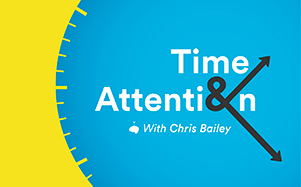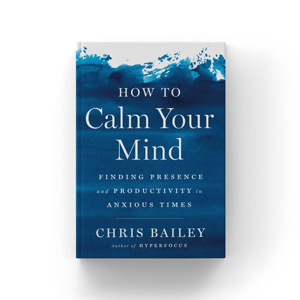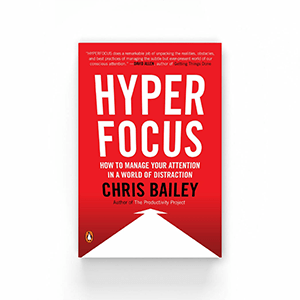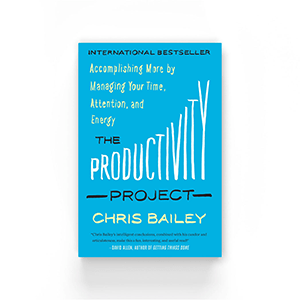Estimated Reading Time: 10 minutes, 45s.
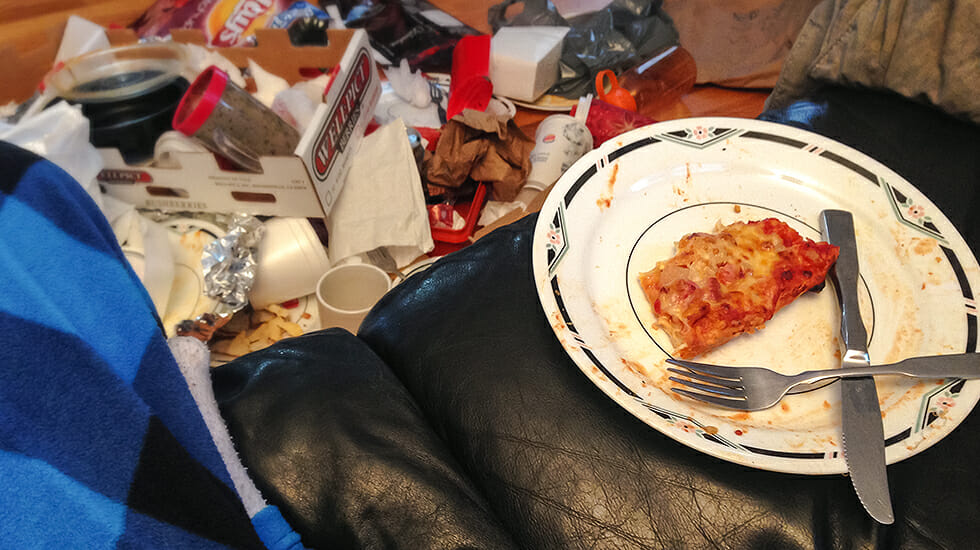
Whether it means meditating for 35 hours in a week, watching 70 hours of TED talks over 7 days, living in total seclusion for 10 days, or using my smartphone for only an hour a day, I love approaching productivity from weird angles, and then writing about everything I learn.
All last week I became a complete slob in the name of productivity. I showered only twice, ordered takeout at least once a day, watched a minimum of 2 hours of TV a day, and didn’t work out, meditate, shave, wake up early, or spend time with people.1 For the experiment I tried to be as productive as possible under these conditions, and like with the experiments that came before this one, I learned a ton, all of which I’ve written about below.
Here are the top 10 lessons I learned about productivity being a complete slob last week!
10. Be kind to yourself
 As much as you might value becoming more productive (like I do), when you don’t take it easy on yourself in the process, you’re not going to appreciate how productive you are in the first place. At the end of the day that’s going to make you a lot less happy, and it will also make all you’ve accomplished mean a lot less. At least that’s what I found. It doesn’t matter how productive you are if you don’t take it easy on yourself along the way. Some great ways to be kind to yourself? Take more breaks, lower your expectations, adopt habits that lead to more happiness, and meditate!
As much as you might value becoming more productive (like I do), when you don’t take it easy on yourself in the process, you’re not going to appreciate how productive you are in the first place. At the end of the day that’s going to make you a lot less happy, and it will also make all you’ve accomplished mean a lot less. At least that’s what I found. It doesn’t matter how productive you are if you don’t take it easy on yourself along the way. Some great ways to be kind to yourself? Take more breaks, lower your expectations, adopt habits that lead to more happiness, and meditate!
9. Even if you want to be a slob (or relax), you should structure your time
Sunday at noon is the least happy and least productive hour in the U.S. Why? Because that’s when people are the least likely to structure their time. Structuring your time (even loosely) helps you focus, motivates you, makes you happier, and gives you purpose because it provides you with a loose framework to live inside of.
Even if you feel like being a complete slob for a week, loosely structuring your time will make sure you stay happy.
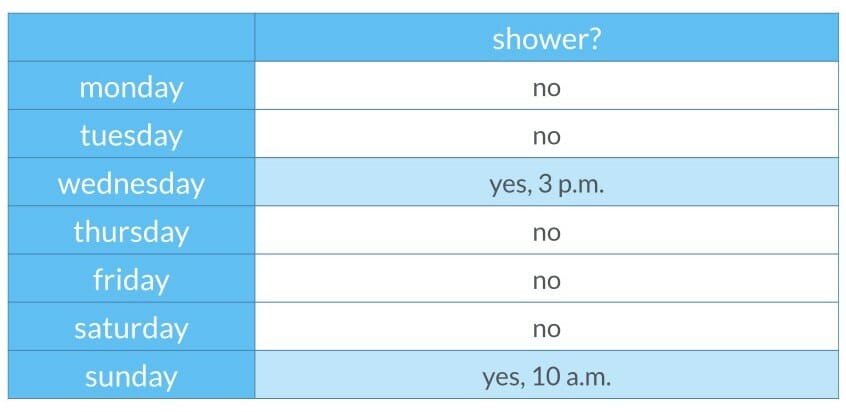
8. The most productive people are crazy-talented at managing their attention
By adopting habits like eating well, working out, and meditating, I’ve gained a pretty good handle on my ability to manage my attention since starting A Year of Productivity.
But during this particular experiment, I found myself constantly on the prowl for an immediate fix, whether in the form of tasty fast food I could order in, something entertaining to watch on TV, or a fun new game I could play on my iPad. Somewhere during the experiment, I completely lost control of my attention, and began bouncing from one distraction to the next.
Depending on how future-oriented you are, you might find yourself in a perpetual dance between the two extremes; jumping between activities that stimulate you in the short-run and ones that are healthy for you in the medium-to-long run.
The better you are at managing your attention, the better you become at directing it toward activities that are better for them in the long-term, while making sure you get enjoyment out what you’re doing in the short-term.
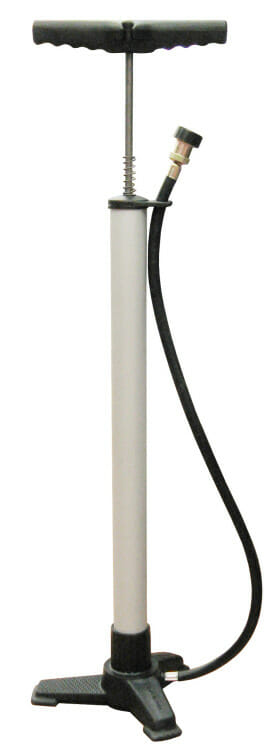 7. Don’t forget to ‘let the air out of your tires’ every so often
7. Don’t forget to ‘let the air out of your tires’ every so often
As much as I’d love to drone on about how you shouldn’t be a slob and you should be productive all the time, blah blah blah, I think it’s important to let the air out of your tires and relax every once in a while. No one is a robot, nor should anyone take becoming more productive too seriously.
I’m not saying that there is any value to being a slob; after all, when you act like a slob you essentially contribute nothing to your own health or the health of the world around you. But there is something to be said about letting some of the air out of your tires every once in a while. Don’t binge, but make sure you reward yourself for reaching your productivity milestones.
Slobbing out is one way to let the air out of our tires, but it’s not very rewarding in the long-run. A much more rewarding way to let the air out of your tires? By creating positive, productive outlets to relieve your stress.
6. Create positive outlets to relieve your stress
When you get stressed out, science has shown that your mind tends to crave quick fixes, even though it’s been proven that quick fixes don’t actually reduce the levels of stress hormones in your body.2 9 positive, tested outlets that actually relieve your stress? Exercise, meditation, reading, listening to music, going for a nature walk, spending time with people you love, getting for a massage, investing in a creative hobby, and attending a religious service.
5. Indulging your desires is not self-love
All week long during the experiment I indulged my desires; eating, watching, and listening to whatever would provide me with a quick fix. But reflecting a bit more on the experiment, I don’t think indulging your desires is the same as self-love.
When you indulge your desires (shopping, eating, watching TV), you essentially invest your time in a distraction that doesn’t provide you with any return beyond some immediate enjoyment. I don’t think you can call something self-love when it damages your mental or physical health. Loving yourself isn’t about indulging your desires; it’s about respecting yourself, and showing compassion for yourself.
Respecting yourself includes creating positive outlets to relieve your stress, and investing time in yourself, instead of just looking for quick fixes. Quick fixes are fun in the moment, but are almost always detrimental for your mental and physical health in the end.
Interlude: My 10 favorite productivity experiments from my year of productivity
10 of my favorite experiments from my year of productivity, in no particular order. Just click on any picture to visit the experiment’s article.
4. Learn how to manage the expectations other people have of you
I think a lot of people trick themselves into thinking that their coworkers or customers rely on them a lot more than they actually do. For that reason they end up never disconnecting from their corporate email for the fear that their coworkers won’t be able to operate without them. Even when I worked for a few companies on co-op work terms, I felt this was the case.
But what I found last week, when I didn’t make myself available, was the exact opposite is true. When people know you’re not available, they always work around you. Unless you’re Barack Obama, the world won’t fall apart when you take a step back from your work. People will find a way to magically solve their problems when you’re not available.
I think one of the best skills you can develop is managing the expectations other people have of you. When people know you won’t be available on evenings, weekends, or when you’re on vacation, you’ll reduce your stress and your overall workload. And since breaks can make you so much more productive, it may even be better for your work in the end.
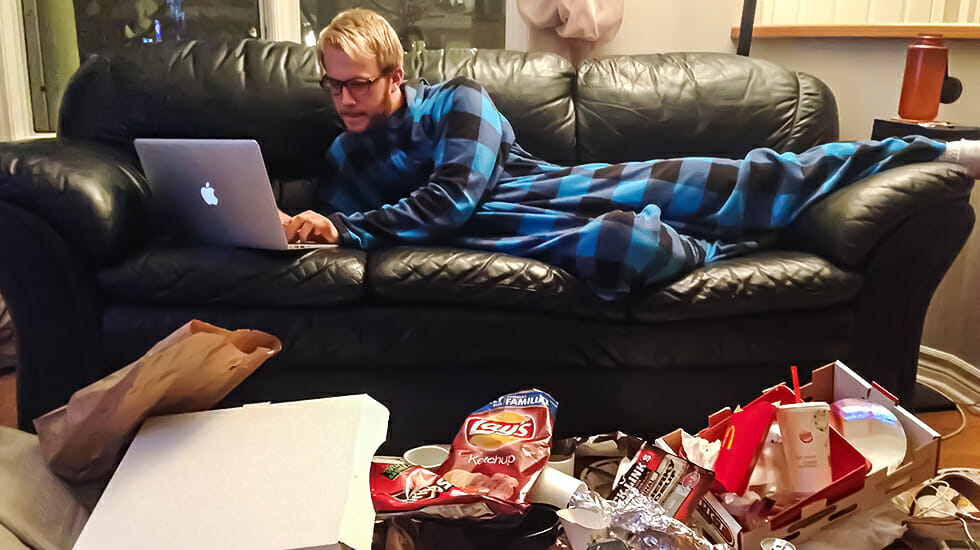
3. Negative habits compound
During my week of being a total slob, I invested my time and energy into only activities that stimulated my mind and body in the short-run, and watched as the negative effects of my new bad habits compounded. From my very first hit of fast food, I noticed my energy levels dip, and then fall precipitously throughout the week. A few days into not showering or eating well, my face broke out in pimples, which made me feel worse about my appearance. Not working out also made me even more demotivated, which made me crave even more junk food. And so on.
I personally think that even though you might see your habits as isolated, they’re very much tangled up in one another. When you adopt a negative habit, it might serve as a gateway habit that compounds to lead to new habits you didn’t anticipate at first, or it might even compromise the good habits you have already. That makes the cost of adopting bad habits greater than you might have anticipated.
Thankfully, positive habits compound too.
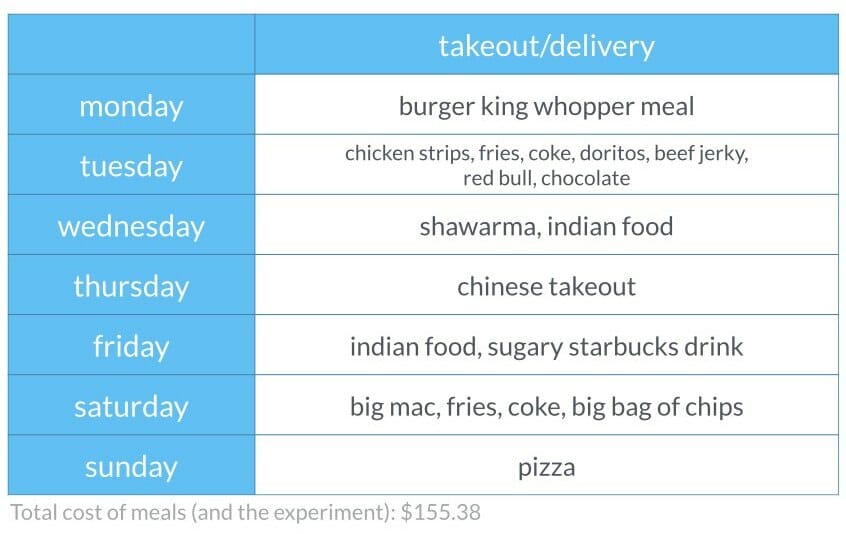
2. Start small
Very small.
I think the key to becoming more productive is to just make one small change at a time. That may sound counterintuitive, but the reason for that is simple: the smaller the change you try to make to your life, the more likely you’ll actually make it.
Interestingly, the more of a slob I became, the more resolved I became to become more productive, but ironically the less energy, willpower, and focus I had to actually make changes to my life. The deeper I fell into the experiment (as much as I could over a week, that is, which ended up being surprisingly quite a bit), the more I wanted to make huge changes to my life, and the more unreasonable I became with what I wanted to accomplish.
The key to making successful changes to your habits, behaviour, and routines is to start small–very small, because that way the changes will actually stick. I’ve been playing around with making changes to my habits and routines for the better part of eight months with this project, and when I make changes to my habits I still try to make them as small as possible so they’ll actually stick.
It’s counterintuitive. But when you only have so much willpower to make changes to your habits, if you want changes to actually stick, make them as small as possible.
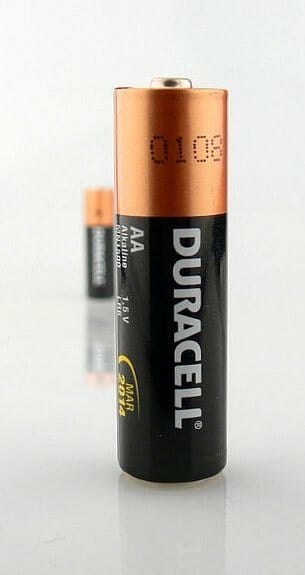 1. Do all you can to find more sources of energy
1. Do all you can to find more sources of energy
About half-way through the experiment I realized something interesting: the way I had designed the experiment, I had effectively removed all of the elements of my life that provide me with the most energy, including exercise, healthy food, meditation, people, waking up early, and feeling clean. After I removed them all at once, my productivity was instantly shot, but the two energy sources that I missed the most were exercise and eating well.
If exercise came in pill form, you would take one every day, because the benefits are that huge. Exercise isn’t just about looking sexy (even though that’s a nice perk). It boosts your brainpower, melts away stress, gives you way more energy, helps prevent heart disease, cancer, diabetes, and immune diseases, works out your heart, makes you live longer, and that’s just for starters.3 If you’re serious about becoming more productive, exercise. It’s that simple. It will cost you some willpower to drag your butt to the gym, but it’s well worth the price of admission.
Secondly, another way to gain a vast amount of energy is to eat better. At its most elemental level, food is the fuel that gets you through each day. If you feed your body with high-octane foods, you naturally provide your mind and body with enough energy to be productive. But if you eat garbage all day (or week) long like I did, your energy levels, motivation, and ability to focus will be shot.
I think if you’re serious about becoming more productive, you should do all you can to find more sources of energy. At our most fundamental level, we humans have two main resources: time and energy. There’s naturally no way to get more time, but there are literally hundreds of things you can do, right now, to get more energy so you can make better use of the time you do have.
Everything in moderation
I’ll admit that there’s a certain freedom to being a slob, where you’re not bound by your own pressures, or pressures from the world around you. Sure, you might feel guilty about wasting your time at first, but after you begin to bounce between entertaining distractions–food, TV, movies, video games, and more food included–you become a proverbial metal ball caught in a pinball machine. You bounce from distraction to distraction, unable to escape the gravitational pull of eating just one more chocolate bar, beating just one more level, or watching just one more episode of House of Cards.
There’s nothing wrong at all with relaxing and putting your feet up–in fact, even though I’m dedicating a year of my life to becoming as productive as possible, I’d argue that relaxing, taking breaks, and putting your mental and physical feet up are essential if you want to become more productive.
But like all good things, slobbiness is a dish that’s best served in moderation. Being a slob zaps you of your energy, mindfulness, motivation, and if you’re not careful, even your happiness, which may be the reason you want to become more productive in the first place.
Battery image courtesy of Anton Fomkin.
Unless you count the cast of House of Cards. ↩
Source: https://chrisbailey.com/9-stress-relief-strategies-that-actually-work/ ↩
Sources: http://men.webmd.com/features/exercise-benefits; http://www.mayoclinic.com/health/exercise/HQ01676; http://www.vanderbilt.edu/AnS/psychology/health_psychology/exercise.htm ↩

